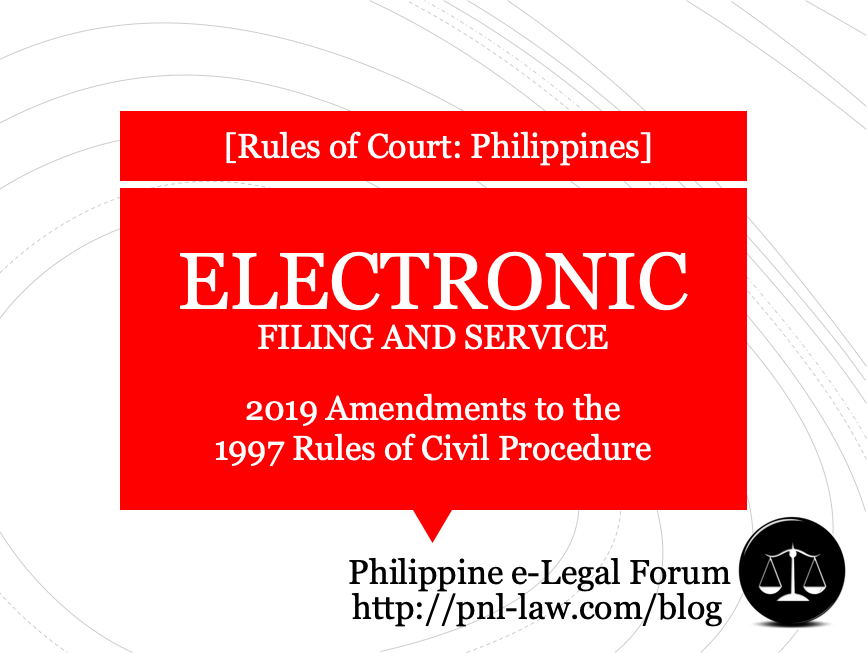The most significant amendments pertain to electronic means of filing and service. Every judgment, resolution, order, pleading subsequent to the complaint, written motion, notice, appearance, demand, offer of judgment or similar papers shall be filed with the court, and served upon the parties affected. The amendments are discussed below.

While this is covered by Rule 13 (“Filing and Service of Pleadings, Judgments and Other Papers“) of the 2019 Proposed Amendments to the 1997 Rules of Civil Procedure (hereinafter, “2019 Amendments”), which takes effect on 1 May 2020, it is more helpful to discuss this separately. The summary/discussion of other Rules may be tracked through the Menu.
I. CONSENT AND AUTHORIZATION
Filing is the act of submitting the pleading or other paper to the court, while service is the act of providing a party with a copy of the pleading or any other court submission.
The filing and service by electronic means require consent/authorization — in case of filing, the court must authorize such mode of filing (in places where the court is electronically equipped), or in case of service, the other party must consent to such mode of service, unless directed by the court.
II. FILING AND PROOF OF FILING
Filing may be done by transmitting through electronic mail or other electronic means. The date of electronic transmission shall be considered as the date of filing.
If the pleading or any other court submission was filed by electronic mail, the same shall be proven by an affidavit of electronic filing of the filing party accompanied by a paper copy of the pleading or other document transmitted or a written or stamped acknowledgment of its filing by the clerk of court. If the paper copy sent by electronic mail was filed by registered mail, then the rule on proof of filing by registered mail applies.
If the pleading or any other court submission was filed through other authorized electronic means, the same shall be proven by an affidavit of electronic filing of the filing party accompanied by a copy of the electronic acknowledgment of its filing by the court.
III. SERVICE AND PROOF OF SERVICE
Service by electronic means shall be made by sending an e-mail to the party’s or counsel’s electronic mail address, or through other electronic means of transmission as the parties may agree on, or upon direction of the court. Service by facsimile shall be made by sending a facsimile copy to the party’s or counsel’s given facsimile number.
Proof shall be made by an affidavit of service executed by the person who sent the e-mail, facsimile, or other electronic transmission, together with a printed proof of transmittal.
IV. CHANGE OF ELECTRONIC MAIL ADDRESS OR FACSIMILE NUMBER
A party who changes his or her electronic mail address or facsimile number while the action is pending must promptly file, within 5 calendar days from such change, a notice of change of e-mail address or facsimile number with the court and serve the notice on all other parties. Service through the electronic mail address or facsimile number of a party shall be presumed valid unless such party notifies the court of any change, as aforementioned.
V. FORMAT
The subject of the electronic mail and facsimile must follow the prescribed format:
- case number
- case title, and
- pleading, order or document title
The title of each electronically-filed or served pleading or other document, and each submission served by facsimile shall contain sufficient information to enable the court to ascertain from the title:
- (a) the party or parties filing or serving the paper,
- (b) nature of the paper,
- (c) the party or parties against whom relief, if any, is sought, and
- (d) the nature of the relief sought.
VI. COURT-ISSUED ORDERS AND OTHER DOCUMENTS
The court may electronically serve orders and other documents to all the parties in the case which shall have the same effect and validity as provided herein. A paper copy of the order or other document electronically served shall be retained and attached to the record of the case.
The following orders, pleadings, and other documents must be served or filed personally or by registered mail when allowed, and shall not be served or filed electronically, unless express permission is granted by the Court: (a) Initiatory pleadings and initial responsive pleadings, such as an answer; (b) Subpoenae, protection orders, and writs; (c) Appendices and exhibits to motions, or other documents that are not readily amenable to electronic scanning may, at the option of the party filing such, be filed and served conventionally; and (d) Sealed and confidential documents or records.
However, judgments, final orders or resolutions shall be served either personally or by registered mail. These documents cannot be served by electronic means. The 2019 Amendments adds that upon ex parte motion of any party in the case, a copy of the judgment, final order, or resolution may be delivered by accredited courier at the expense of such party.
VII. COMPLETENESS OF SERVICE
Electronic service is complete at the time of the electronic transmission of the document, or when available, at the time that the electronic notification of service of the document is sent. Electronic service is not effective or complete if the party serving the document learns that it did not reach the addressee or person to be served.
Service by facsimile transmission is complete upon receipt by the other party, as indicated in the facsimile transmission printout.
